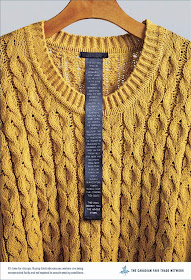Next week sees the second Fashion Revolution Day. On the 24nd of April, the anniversary of the Rana Plaza disaster, people all over the globe will be taking time to ask the essential question--where do my clothes come from?
In the run-up to Fashion Revolution Day, The View From The Pier will be looking at the whole concept of fashion in the 21st century. Can you ever be truly ethical? What needs to change to make fashion a force for good? Most importantly, as we look at the event that sparked off the whole campaign: what can be done to ensure we never see another Rana Plaza?
The upcoming documentary The True Cost (which we featured on The View last week) has interviewed some big names in the ethical fashion field and asked these questions. They're featuring extended versions of these interviews on their site.
Maxine Bédat, founder of ethical fashion retailer Zady, recently spoke to The True Cost. Her comments were, to say the least, eye-opening. They can also serve as a call to arms, and a way of understanding that the current model that we call fast fashion isn't just broken--it's actively harmful.
Here she is on the global impact of fast fashion:
"The fast fashion model that has emerged in the past two decades is based on producing the lowest cost product possible. Human labor has always been the greatest cost of production, to create these disposable prices these companies have created a race to the bottom searching the globe for ever cheaper labor. To cut corners on the production of the material, fast fashion companies are producing the material by the cheapest means possible which translates to working in countries with little environmental regulation. They are, in essence, outsourcing the true cost of the apparel to those countries desperate enough to take them. As a result of all this, the apparel sector is the second most polluting industry in the world and a major contributor to slave labor."
The notion of cheap foreign goods is hardly a surprise, of course. But over the last twenty years we have seen a radical uptick in the amount of clothes we buy, even as the price we pay for them drops like a stone. It's not hard to see how this is possible, yet somehow we as consumers seem incapable of joining the dots, of understanding that materials and labour have to be at rock-bottom prices and made using sweatshop conditions to make apparal this cheaply. It's almost as if, in outsourcing the manufacturing, we've also outsourced our ability to care.
This wilful disregard for basic economic sense seems to extend to the brands themselves. Maxine says:
"We exist in a world where 61% of clothing companies don’t even know where their garments were made. 76% don’t know where their fabric was woven, knitted or dyed, and 93% don’t know the origins of the raw fibre, so you can see that while we find it quite basic to have this type of understanding, it’s a completely different way of doing business. Knowing the source is the only way to create a product with integrity."
I find it staggering that you can make and sell a product without knowing where the raw materials have come from, and yet that's exactly what's happening with fast fashion. The extended, opaque supply chain at the heart of the business means that brands can act in a kind of self-imposed bubble, only responding to calls for reform when they are actively caught in the act. Even then change is begrudging, and slow.
But change is happening, and events like Fashion Revolution Day are key to that. Maxine concludes hopefully, and with a rallying cry to the people that really can make a difference... us.
"As a consumer you have enormous power. When you make a purchase you are taking a stand, making a vote for what you believe in. We have the power to make fast fashion just a momentary blip in fashion history. That to me is incredibly exciting."
For more, check out the full interview with Maxine at The True Cost's blog:
http://truecostmovie.com/maxine-bedat-interview/






